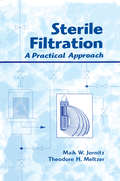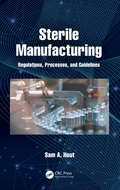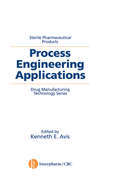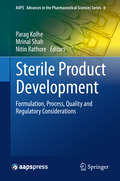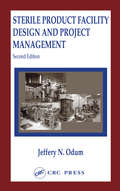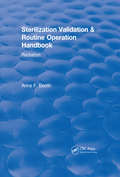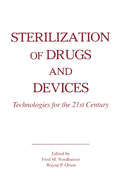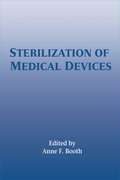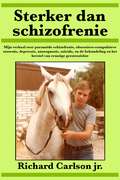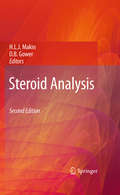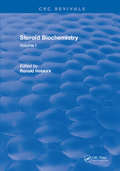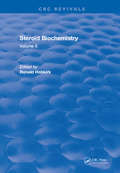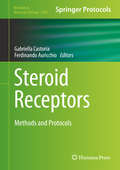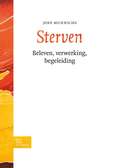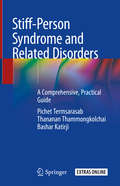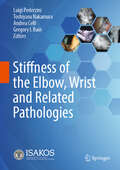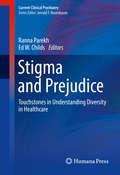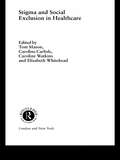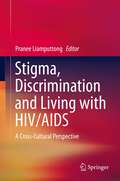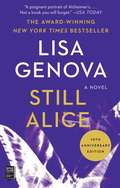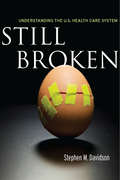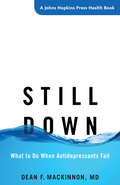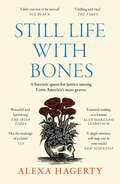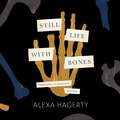- Table View
- List View
Sterile Filtration: A Practical Approach
by Maik W. JornitzThis book focuses on sterilizing grade filters in the biopharmaceutical industry, emphasizing practical applications of universal and dependable operational protocols, integrity testing, and troubleshooting to streamline the production and preparation of pharmaceuticals.Addresses the complexities of globalizing redundancy in filtration! <BR
Sterile Manufacturing: Regulations, Processes, and Guidelines
by Sam A. HoutThis book highlights key ideas and factors to coach and guide professionals involved in learning about Sterile Manufacturing and operational requirements. It covers regulations and guidelines instituted by the FDA, ISPE, EMA, MHRA, and ICH, emphasizing good manufacturing practice and inspection requirements in the manufacturing of medicinal products. Additionally, this book provides the fundamentals of aseptic techniques, quality by design, risk assessment, and management in support of sterile operations applications. It creates a link to the implementation of business practices in drug manufacturing and healthcare and forms a correlation between design strategies including a step-by-step process to ensure reliability, safety, and efficacy of healthcare products for human and animal use. The book also provides a connection between drug production and regulated applications by offering a review of the basic elements of sterile processing, and how to remain viable with solid strategic planning. The book is a concise reference for professionals and learners in the field of sterile operations that governs primarily, pharmaceutical and medical device space, but can also extend to food and cosmetics that require clean (aseptic) manufacturing applications. It also helps compounding pharmacists and GMP inspectors and auditors.
Sterile Pharmaceutical Products: Process Engineering Applications (Drug Manufacturing Technology Ser.)
by Kenneth E. AvisSterile Pharmaceutical Products: Process Engineering Applications addresses the key concepts and applications of the sterile pharmaceutical manufacturing industry. It covers elements of the design, installation, validation, and usage of critical processes associated with sterile product manufacture. From water systems to clean-in-place systems, to sterile powder handling and robotic applications in sterile production environments, this book addresses the issues of system implementation, integration, and operations. Written by recognized experts and peer reviewed for accuracy, all chapters include references to supplemental resources and numerous illustrations.
Sterile Product Development
by Parag Kolhe Mrinal Shah Nitin RathoreThis comprehensive book encompasses various facets of sterile product development. Key concepts relevant to the successful development of sterile products are illustrated through case studies and are covered under three sections in this book: * Formulation approaches that discuss a variety of dosage forms including protein therapeutics, lipid-based controlled delivery systems, PEGylated biotherapeutics, nasal dosage form, and vaccines * Process, container closure and delivery considerations including freeze-thaw process challenges, best practices for technology transfer to enable commercial product development, innovations and advancement in aseptic fill-finish operations, approaches to manufacturing lyophilized parenteral products, pen / auto-injector delivery devices, and associated container closure integrity testing hurdles for sterile product closures * Regulatory and quality aspects in the areas of particulate matter and appearance evaluation, sterile filtration, admixture compatibility considerations, sterilization process considerations, microbial contamination investigations and validation of rapid microbiological methods, and dry and moist heat sterilizers This book is a useful resource to scientists and researchers in both industry and academia, and it gives process and product development engineers insight into current industry practices and evolving regulatory expectations for sterile product development.
Sterile Product Facility Design and Project Management
by Jeffrey N. OdumKnowing how to deal with the regulatory issues, understanding the impacts of cleanliness, and recognizing the affect that poor facility layout will have on GMP spaces are only some of the issues an experienced Project Manager must focus on. Completely revised and updated, Sterile Product Facility Design and Project Management, Second Edition provid
Sterilization Validation and Routine Operation Handbook: Radiation (CRC Press Revivals)
by Anne F BoothThe validation and radiation sterilization process for biomaterials and medical devices requires careful planning to ensure regulatory compliance followed by precise accuracy in execution and documentation. This in-depth guide details all steps from prevalidation planning to final report and ongoing monitoring and control. Sterilization Validation & Routine Operation Handbook: Radiation provides a framework for the validation and routine operation of an irradiation sterilization process. The guidance presented complies with ANSI/AAMI/ISO 11137: 1994, Sterilization of health care product-Requirements for validation and routine control-Radiation sterilization and the newly published AAMI substantiation of 25 kGy using VDmax procedure. The author discusses methods to aid in comprehending the requirements in these standards. She also provides practical procedures for the validation and routine monitoring and control of specific gamma and electron beam radiation sterilization processes.Background chapters provide needed information on radiation sterilization technologies, sterilization microbiology, validation approaches and working with a radiation sterilization contractor. Much of the information in this new book is presented in convenient tables and charts, with diagrams and other schematics that simply illustrate appropriate validation methodologies. Sterilization Validation & Routine Operation Handbook: Radiation brings together in one resource information scattered throughout many documents and will be useful to all those involved in the sterilization of medical materials, drugs and devices.
Sterilization of Drugs and Devices: Technologies for the 21st Century
by Fred M. Nordhauser Wayne P. OlsonEditors Fred M. Nordhauser and Wayne P. Olson have gathered a team of 18 experts from multi-national and leading edge companies to explore the advantages and disadvantages of current sterilization technologies. They cover the theory behind the technology, the practical concerns of installation from engineering and product development perspectives, the "how to validate" concern, and the pragmatics of implementation in a manner that will satisfy the regulatory agencies. The broad range of in-depth information on numerous technologies will help readers design sterile manufacturing processes cost effectively and efficiently.
Sterilization of Medical Devices
by Anne BoothThis book presents vital information on international sterilization standards and guidance on practical application of these standards in the manufacturing process. It covers validation, industrial sterilization methods, emerging sterilization techniques, laboratory testing, manufacturing of sterile devices, and device reuse. Excerpted from The Validator, edited by Anne F. Booth, more than fifty experts share their knowledge of current technologies in easy-to-understand articles that establish methods to ensure compliance. Contents include reviews of ISO sterilization standards, industrial sterilization methods and technologies, and support testing methodologies.
Sterilized by the State
by Randall Hansen Desmond KingThis book is the first comprehensive analysis of eugenics in North America focused on the second half of the twentieth century. Based on new research, Randall Hansen and Desmond King show why eugenic sterilization policies persisted after the 1940s in the United States and Canada. Through extensive archival research, King and Hansen show how both superintendents at homes for the 'feebleminded' and pro-sterilization advocates repositioned themselves after 1945 to avoid the taint of Nazi eugenics. Drawing on interviews with victims of sterilization and primary documents, this book traces the post-1940s development of eugenic policy and shows that both eugenic arguments and committed eugenicists informed population, welfare, and birth control policy in postwar America. In providing revisionist histories of the choice movement, the anti-population growth movement, and the Great Society programs, this book contributes to public policy and political and intellectual history.
Sterker dan schizofrenie
by Richard Carlson Jr. Audrey LiauwMijn verhaal over paranoïde schizofrenie, obsessieve-compulsieve stoornis, depressie, anosognosie, suïcide, en de behandeling en het herstel van ernstige geestesziekte
Steroid Analysis
by D. B. Gower Hugh L. MakinThe second edition of this handbook concentrates on the analysis of steroids in biological fluids. It offers analysis of low levels of steroid analytes in biological fluids. This new edition also provides an extra chapter on pharmaceutical aspects of steroid analysis. Coverage details spectroscopic and other methods, including UV and IR absorption spectroscopy, NMR spectroscopy, mass spectrometry, X-ray diffraction, chromatography and immunoassay of steroids.
Steroid Biochemistry: Volume I
by R. HobkirkAn attempt has been made to attract contributions which illustrate the importance of certain enzymatic processes involved in steroid biosynthesis and metabolism and, in some cases, leading to steroidal action in target sites. Investigators actively engaged in research in such areas were invited to present their material in a manner which they considered fitting. It is hoped that as a result if this, the publication will possess sufficient depth to warrant approval. The blend of review material and experimental data originating in the author laboratories will, it is felt, make for useful reading.
Steroid Biochemistry: Volume II
by R. HobkirkAn attempt has been made to attract contributions which illustrate the importance of certain enzymatic processes involved in steroid biosynthesis and metabolism and, in some cases, leading to steroidal action in target sites. Investigators actively engaged in research in such areas were invited to present their material in a manner which they considered fitting. It is hoped that as a result if this, the publication will possess sufficient depth to warrant approval. The blend of review material and experimental data originating in the author laboratories will, it is felt, make for useful reading.
Steroid Receptors: Methods and Protocols (Methods in Molecular Biology #1204)
by Gabriella Castoria Ferdinando AuricchioSteroid Receptors: Methods and Protocols presents a selection of techniques that have been recently applied to the analysis of steroid receptors, powerful tools for the advancement of our understanding of both the mechanisms regulating gene transcription and the rapid signaling responses of tissues to signals. Research in this area has generated a wealth of data allowing the elucidation of steroid receptor mechanisms and improving the treatment of many endocrine disorders, above all cancers. Chapters cover methods to analyze gene transcription, chromatin and proteomic modifications, extra-nuclear signaling regulation, development of cell and animal models, and preparation of new antibodies. Written in the successful Methods in Molecular Biology series format, chapters include introductions to their respective topics, lists of the necessary materials and reagents, step-by-step, readily reproducible protocols and notes on troubleshooting and avoiding known pitfalls. Authoritative and easily accessible, Steroid Receptors: Methods and Protocols offers an updated view on a variety of modern methods that will hopefully contribute to improving our knowledge on the integration of steroid receptors in single or different functionally connected cellular contexts under a variety of physiological and pathological conditions, above all tumors.
Sterven
by Joep MunnichsSterven is een natuurlijk proces. De mens heeft het echter door zijn bange verwachting omgeven met voorstellingen die afschrikken. Spreken over sterven of over ervaringen van stervenden wordt uit de weg gegaan. Maar zij die stervenden hebben bijgestaan, doen niets liever dan erover praten. Zij hebben het meestal een bijzondere ervaring gevonden. Vaak hebben zij ook een andere kijk op sterven gekregen. Hoe wordt het gaan sterven beleefd? En wat zijn de ervaringen van mensen die stervenden begeleiden?
Stiff-Person Syndrome and Related Disorders: A Comprehensive, Practical Guide
by Bashar Katirji Pichet Termsarasab Thananan ThammongkolchaiThis comprehensive title covers all of the broad aspects of stiff-person spectrum disorders (SPSD), ranging from clinical features and laboratory investigations to the basic scientific roles of neuroimmunology and genetics that aid clinicians in understanding the pathogenesis of this disorder.Organized across 15 chapters, this highly practical book begins with a thorough account of the history and clinical phenomenology of SPSD. Subsequent chapters then delve into the differential diagnoses of the disorder, as well as its electrophysiology, immunopathogenesis, and neurochemistry. Following this is an analysis of each subtype of SPSD including classic stiff-person syndrome and its variants, correlations between clinical phenotypes and antibodies, as well as SPSD in the pediatric population. Finally, the book concludes with an examination of the various SPSD diagnostic approaches, treatments, and potential emergencies seen in clinical practice.Developed by a renowned multidisciplinary authorship, Stiff-Person Syndrome and Related Disorders is an indispensable contribution to the clinical literature and will be of great interest to both clinicians and basic science researchers.
Stiffness of the Elbow, Wrist and Related Pathologies
by Gregory I. Bain Toshiyasu Nakamura Andrea Celli Luigi PederziniThis book presents the most current diagnostic and therapeutic strategies to manage elbow and wrist stiffness, conditions of pathological anatomical damage that severely limit daily activities.Readers will discover possible causes, most current classification systems, clinical and instrumental evaluations, as well as therapeutic choices from the conservative treatment to the prosthetic implant. Moreover, a dedicated section will be devoted to associated injuries that can complicate both the diagnosis and treatment. Published in collaboration with ISAKOS, this book will be of interest to orthopedists, sports physicians and physiotherapists wishing to deepen their knowledge in the complex field of upper limb functionality.
Stigma and Prejudice
by Ranna Parekh Ed W. ChildsIn this innovative title, the authors describe unique patient populations affected by stigma and prejudice and the prevalence of these issues to all healthcare providers. Each chapter covers the forms of prejudice and stigma associated with minority statuses, including religious minorities, the homeless, as well as those stigmatized by medical serious medical conditions, such HIV/AIDS, obesity, and substance misuse disorders. The chapters focus on the importance of recognizing biological differences and similarities within such groups and describes the challenges and best practices for optimum healthcare outcomes. The text describes innovative ways to connect in a clinical setting with people of diverse backgrounds. The text also covers future directions and areas of research and innovative clinical work being done. Written by experts in the field, Stigma and Prejudice is an excellent resource for psychiatrist, psychologists, general physicians, social workers, and all other medical professionals working with stigmatized populations.
Stigma and Social Exclusion in Healthcare
by Tom Mason Caroline Watkins Caroline Carlisle Elizabeth WhiteheadWhilst those in healthcare might like to think that they work to reduce stigma and social exclusion of others, this book reveals many strategies by which healthcare professionals contribute to increasing these conditions. Written by practitioners, some of whom have themselves been stigmatised, the book exposes the hidden processes of prejudice and the dogma of ideology that permeate contemporary healthcare. Engaging with the realities of stigma through a grassroots approach, topics covered include:* hearing* sight* sexuality* HIV and AIDS* drug use* teenage pregnancy* breastfeeding* old age.Stigma and Social Exclusion in Healthcare provides practical solutions to problems, recommendations for training and a blueprint for the future. It will prove a valuable reference for all those wanting to deal with the issues of stigmatisation.
Stigma, Discrimination and Living with HIV/AIDS
by Pranee LiamputtongUp until now, many articles have been written to portray stigma and discrimination which occur with people living with HIV/AIDS (PLWHA) in many parts of the world. But this is the first book which attempts to put together results from empirical research relating to stigma, discrimination and living with HIV/AIDS. The focus of this book is on issues relevant to stigma and discrimination which have occurred to individuals and groups in different parts of the globe, as well as how these individuals and groups attempt to deal with HIV/AIDS. The book comprises chapters written by researchers who carry out their projects in different parts of the world and each chapter contains empirical information based on real life situations. This can be used as an evidence for health care providers to implement socially and culturally appropriate services to assist individuals and groups who are living with HIV/AIDS in many societies. The book is of interest to health care providers who have their interests in working with individuals and groups who are living with HIV/AIDS from a cross-cultural perspective. It will be useful for students and lecturers in courses such as anthropology, sociology, social work, nursing, public health and medicine. In particular, it will assist health workers in community health centres and hospitals in understanding issues related to HIV/AIDS and hence provide culturally sensitive health care to people living with HIV/AIDS from different social and cultural backgrounds. The book is useful for anyone who is interested in HIV/AIDS-related stigma and discrimination in diverse social and cultural settings.
Still Alice
by Lisa GenovaIn Lisa Genova’s extraordinary New York Times bestselling novel, an accomplished woman slowly loses her thoughts and memories to Alzheimer’s disease—only to discover that each day brings a new way of living and loving. Now a major motion picture starring Julianne Moore, Alec Baldwin, Kate Bosworth, and Kristen Stewart!Alice Howland, happily married with three grown children and a house on the Cape, is a celebrated Harvard professor at the height of her career when she notices a forgetfulness creeping into her life. As confusion starts to cloud her thinking and her memory begins to fail her, she receives a devastating diagnosis: early onset Alzheimer’s disease. Fiercely independent, Alice struggles to maintain her lifestyle and live in the moment, even as her sense of self is being stripped away. In turns heartbreaking, inspiring, and terrifying, Still Alice captures in remarkable detail what it’s like to literally lose your mind... Reminiscent of A Beautiful Mind, Ordinary People, and The Curious Incident of the Dog in the Night-time, Still Alice packs a powerful emotional punch and marks the arrival of a strong new voice in fiction.
Still Broken
by Stephen M. DavidsonThe debate over health care policy in the U. S. did not end when President Obama signed the landmark Patient Protection and Affordable Care Act (PPACA) on March 23, 2010. Since then, half the states have sued and federal judges have issued conflicting rulings about the law's constitutionality. In addition, the new Republican-controlled House of Representatives voted to repeal it, and Republicans have pledged to bring it up again during negotiations over the 2012 federal budget. The continuing controversies over PPACA are only one reason that Still Broken: Understanding the U. S. Health Care System is a must-read for engaged citizens, policymakers, students, and scholars alike. The book takes a close look at our problems, proposes solutions to them, and explains how to navigate our political system to effect positive change. It will help readers: * Assess the arguments made by partisans on both sides of the continuing debate. * Understand why President Obama was able to get Congress to pass a comprehensive reform bill even though most of his predecessors tried and failed. * Understand why so many Americans are either confused about its value or actually oppose it. In the book's first part, Stephen M. Davidson paints a lucid picture of the way that the health system works and the forces that produced the monumental problems that we face today. Then, he makes a compelling case for overhauling our system, offering six elements for inclusion in any plan for change. Davidson devotes the last three chapters to a detailed examination of the politics of reform. This assessment will help readers to appreciate both the political achievement represented by passage of the new law and the reasons that opposition to the law remains so widespread, despite all the good it does for the public. Whatever compromises, if any, are accepted by negotiators in the end, the book makes clear why, to fully solve the system's problems, the underlying goal must be to change incentives for all players who participate in the system and, finally, why this goal cannot be achieved by relying solely on market-based solutions. Davidson's captivating and persuasive book demonstrates that only a solution with a large public-sector role can lead us to real reform.
Still Down: What to Do When Antidepressants Fail (A Johns Hopkins Press Health Book)
by Dean F. MacKinnonExpert insight and advice to help people with treatment-resistant depression feel better.Major depressive disorder is a common medical condition that can be disabling and can persist for months, even years. Many people experience depression symptoms that resist treatment. Although they try various combinations of medications, psychotherapy, or electroconvulsive therapy, their symptoms don’t improve. What can people who have treatment-resistant depression do to overcome their depression and feel better? In Still Down, Dr. Dean F. MacKinnon, a psychiatrist at Johns Hopkins Medical School, presents nine composite stories drawn from patients he has seen in his twenty years as an expert in treatment-resistant mood disorders. The first section of the book features people diagnosed with depression who have not yet received appropriate treatment. The next section looks at misdiagnosis, focusing on people who feel and appear depressed but who have different mood disorders and need treatment for them. Finally, Dr. MacKinnon describes people who have severe depression that does not respond to any treatment, regardless of how finely tuned the treatment might be. These people, who suffer from true treatment-resistant depression (TRD), can benefit from a variety of treatments to feel better. Dr. MacKinnon provides commentary to explain and extend the discussion of the patients and situations in each case. He also discusses common obstacles to improvement, including overly conservative dosing, problems stemming from not adhering to treatment, antidepressant failure, and high sensitivity to side effects. By identifying aspects of the individual’s qualities, behaviors, and experiences that may account for poor response to treatment, Still Down points the way for people with TRD and their families to find appropriate diagnoses and the best possible care.
Still Life with Bones: 'I defy you not to be moved' - Sue Black
by Dr Alexa HagertyAn anthropologist working with forensic teams and victims' families to investigate crimes against humanity in Latin America explores what science can tell us about the lives of the dead in this haunting account of grief, the power of ritual, and a quest for justice."Exhumation can divide brothers and restore fathers, open old wounds and open the possibility of regeneration-of building something new with the pile of broken mirrors that is loss and mourning."Over the course of Guatemala's thirty-year armed conflict -the longest ever in Central America-over 200,000 people were killed. During Argentina's military dictatorship in the seventies, over 30,000 people were disappeared. Today, forensic anthropologists in each country are gathering evidence to prove atrocities and seek justice. But these teams do more than just study skeletons-they work to repair families and countries torn apart by violence.In Still Life with Bones, anthropologist Alexa Hagerty learns to see the dead body with a forensic eye. She examines bones for evidence of torture and fatal wounds-hands bound by rope, cuts from machetes-but also for signs of a life lived: to articulate how life shapes us down to the bone. A weaver is recognized from the tiny bones of the toes, molded by years of kneeling before a loom; a girl is identified alongside her pet dog. In the tenderness of understanding these bones, Hagerty discovers how exhumation serves as a ritual in the naming and placement of the dead, and connects ancestors with future generations. She shows us how this work can bring meaning to families dealing with unimaginable loss, and how its symbolic force can also extend to entire societies in the aftermath of state terror and genocide. Encountering the dead has the power to transform us, making us consider each other, our lives, and the world differently.Weaving together powerful stories about investigative breakthroughs, grieving families, histories of violence, and her own forensic coming of age, Hagerty crafts a moving portrait of the living and the dead."Touching, but achingly honest-a most amazing account of training as a forensic anthropologist. When Hagerty talks about "lives being violently made into bones," I defy you not to be moved. The text is unflinching, but then the crimes and the victims deserve nothing less. I guarantee this will make you think long and hard about cruelty and human rights and the dedication and humanity of the forensic scientist." - PROFESSOR DAME SUE BLACK
Still Life with Bones: 'I defy you not to be moved' - Sue Black
by Dr Alexa HagertyAn anthropologist working with forensic teams and victims' families to investigate crimes against humanity in Latin America explores what science can tell us about the lives of the dead in this haunting account of grief, the power of ritual, and a quest for justice."Exhumation can divide brothers and restore fathers, open old wounds and open the possibility of regeneration-of building something new with the pile of broken mirrors that is loss and mourning."Over the course of Guatemala's thirty-year armed conflict -the longest ever in Central America-over 200,000 people were killed. During Argentina's military dictatorship in the seventies, over 30,000 people were disappeared. Today, forensic anthropologists in each country are gathering evidence to prove atrocities and seek justice. But these teams do more than just study skeletons-they work to repair families and countries torn apart by violence.In Still Life with Bones, anthropologist Alexa Hagerty learns to see the dead body with a forensic eye. She examines bones for evidence of torture and fatal wounds-hands bound by rope, cuts from machetes-but also for signs of a life lived: to articulate how life shapes us down to the bone. A weaver is recognized from the tiny bones of the toes, molded by years of kneeling before a loom; a girl is identified alongside her pet dog. In the tenderness of understanding these bones, Hagerty discovers how exhumation serves as a ritual in the naming and placement of the dead, and connects ancestors with future generations. She shows us how this work can bring meaning to families dealing with unimaginable loss, and how its symbolic force can also extend to entire societies in the aftermath of state terror and genocide. Encountering the dead has the power to transform us, making us consider each other, our lives, and the world differently.Weaving together powerful stories about investigative breakthroughs, grieving families, histories of violence, and her own forensic coming of age, Hagerty crafts a moving portrait of the living and the dead."Touching, but achingly honest-a most amazing account of training as a forensic anthropologist. When Hagerty talks about "lives being violently made into bones," I defy you not to be moved. The text is unflinching, but then the crimes and the victims deserve nothing less. I guarantee this will make you think long and hard about cruelty and human rights and the dedication and humanity of the forensic scientist." - PROFESSOR DAME SUE BLACK(P) 2023 Headline Publishing Group Ltd
